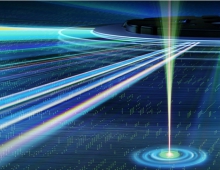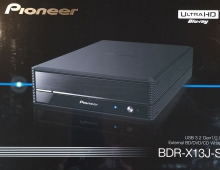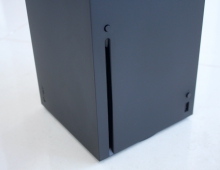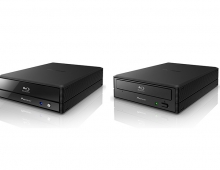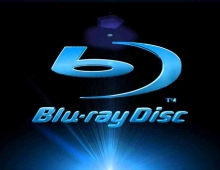
Microsoft and Intel to Back HD DVD Format
Microsoft and Intel are throwing their full weight behind one side in the long-running battle over the format for the next generation of high-definition DVD's.
The two companies announced today that they are backing the HD-DVD format developed by
Toshiba over the Blu-ray standard championed by Sony, Matsushita Electric, Samsung and
others. Microsoft announced in June that it would work with Toshiba to develop
high-definition DVD players. Now, Microsoft and Intel say they will develop software and
chips that will allow personal computers to play the next-generation DVD's from Toshiba.
The companies said they had not ruled out incorporating Blu-ray technology in their operating systems and on their chips in the future. But they are convinced that as of now, the HD-DVD format discs can be produced more cheaply and more quickly than the Blu-ray discs, and are therefore likely to become the dominant technology.
For the last two years, Microsoft and Intel have been careful not to alienate either camp in the format battle because they sell software and components to companies on each side. They also hoped that the electronics makers and Hollywood studios developing the formats would reach a compromise.
But the major Hollywood studios are now split between the formats, and electronics companies on both sides plan to start selling next-generation DVD players as early as Christmas. Sony also plans to include Blu-ray technology in its new PlayStation 3 game console to be released next spring.
"We were neutral for a long time," Jordi Ribas, the director of technical strategy for Windows at Microsoft, said. "But we're approaching the time when this has to come to market and from our standpoint, the earlier the better."
In a statement issued in Tokyo on behalf of the HD DVD Promotion Group, Memory-Tech Corporation, NEC Corporation, SANYO Electric Co., Ltd. and Toshiba Corporation, noted that: "The participation of the two global leaders in the IT industry will assure enhancement of HD DVD format promotion, bring their technical and marketing expertise to the Group, and will contribute to the early market penetration of HD DVD products."
"SANYO believes that the participation of the two leaders of the US IT industry in the HD DVD Promotion Group will accelerate the synergistic conversion of the technologies they have nurtured in the PC and server industries with those from the digital consumer domain, encouraging further technology innovation and the creation of new markets," said Hiroshi Ono, General Manager of SANYO?s R&D Headquarters.
The Blu-ray allies completely disagree. "This announcement does little to shift the momentum that's been building for Blu-ray Disc," said Marty Gordon, vice president of Blu-ray backer Philips Electrics. "It has dramatically more support from the consumer electronics industry, the PC manufacturers and the games hardware manufacturing side, as well as strong support form movie studios, music companies and game software developers."
Though Microsoft and Intel do not make DVD machines, they benefit from the sale of next-generation discs because consumers will also want to play the new discs on their PC's. That means that the computer operating system will have to be designed to read those discs.
Microsoft and Intel say that Toshiba has proven that its discs can be copied onto hard drives and home servers and sent over home networks. The companies also favor the "hybrid" disc developed by Toshiba that includes a standard definition version of a movie (DVD Video) on one side and a high-definition version on the other side.
Their decision to support Toshiba's HD-DVD format also creates another fissure in the tug of war between the companies backing the two formats.
For instance, Dell and Hewlett-Packard, two of the world's largest PC makers, are part of the Blu-ray group. Their computers, assuming they include Microsoft and Intel products, will be capable of playing HD-DVD discs. But if they want their machines to play Blu-ray discs, they may have to find a third-party to design software for them.
"HP remains committed to the Blu-ray Disc format because of larger storage capacity, broad industry support and the inherent compatibility that the recording format provides to our customers," the company said in a statement. "HP believes that this announcement from Microsoft and Intel is inconsequential for consumers because they do not deliver products into the marketplace (with a few minor exceptions)."
In addition to developing software to play HD-DVD discs on PC's, Microsoft may also create software so its new Xbox game console, which will be released later this year, will be able to play HD-DVD discs.
The companies said they had not ruled out incorporating Blu-ray technology in their operating systems and on their chips in the future. But they are convinced that as of now, the HD-DVD format discs can be produced more cheaply and more quickly than the Blu-ray discs, and are therefore likely to become the dominant technology.
For the last two years, Microsoft and Intel have been careful not to alienate either camp in the format battle because they sell software and components to companies on each side. They also hoped that the electronics makers and Hollywood studios developing the formats would reach a compromise.
But the major Hollywood studios are now split between the formats, and electronics companies on both sides plan to start selling next-generation DVD players as early as Christmas. Sony also plans to include Blu-ray technology in its new PlayStation 3 game console to be released next spring.
"We were neutral for a long time," Jordi Ribas, the director of technical strategy for Windows at Microsoft, said. "But we're approaching the time when this has to come to market and from our standpoint, the earlier the better."
In a statement issued in Tokyo on behalf of the HD DVD Promotion Group, Memory-Tech Corporation, NEC Corporation, SANYO Electric Co., Ltd. and Toshiba Corporation, noted that: "The participation of the two global leaders in the IT industry will assure enhancement of HD DVD format promotion, bring their technical and marketing expertise to the Group, and will contribute to the early market penetration of HD DVD products."
"SANYO believes that the participation of the two leaders of the US IT industry in the HD DVD Promotion Group will accelerate the synergistic conversion of the technologies they have nurtured in the PC and server industries with those from the digital consumer domain, encouraging further technology innovation and the creation of new markets," said Hiroshi Ono, General Manager of SANYO?s R&D Headquarters.
The Blu-ray allies completely disagree. "This announcement does little to shift the momentum that's been building for Blu-ray Disc," said Marty Gordon, vice president of Blu-ray backer Philips Electrics. "It has dramatically more support from the consumer electronics industry, the PC manufacturers and the games hardware manufacturing side, as well as strong support form movie studios, music companies and game software developers."
Though Microsoft and Intel do not make DVD machines, they benefit from the sale of next-generation discs because consumers will also want to play the new discs on their PC's. That means that the computer operating system will have to be designed to read those discs.
Microsoft and Intel say that Toshiba has proven that its discs can be copied onto hard drives and home servers and sent over home networks. The companies also favor the "hybrid" disc developed by Toshiba that includes a standard definition version of a movie (DVD Video) on one side and a high-definition version on the other side.
Their decision to support Toshiba's HD-DVD format also creates another fissure in the tug of war between the companies backing the two formats.
For instance, Dell and Hewlett-Packard, two of the world's largest PC makers, are part of the Blu-ray group. Their computers, assuming they include Microsoft and Intel products, will be capable of playing HD-DVD discs. But if they want their machines to play Blu-ray discs, they may have to find a third-party to design software for them.
"HP remains committed to the Blu-ray Disc format because of larger storage capacity, broad industry support and the inherent compatibility that the recording format provides to our customers," the company said in a statement. "HP believes that this announcement from Microsoft and Intel is inconsequential for consumers because they do not deliver products into the marketplace (with a few minor exceptions)."
In addition to developing software to play HD-DVD discs on PC's, Microsoft may also create software so its new Xbox game console, which will be released later this year, will be able to play HD-DVD discs.

